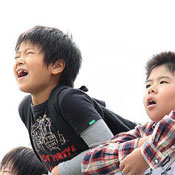- REVIEW
- READER REVIEWS
I Wish (Kiseki)
|
|
Genre
Drama
Distributor
Magnolia Pictures
Release Date
May 11, 2012
Release Notes
NY/LA
Official Website
Review
Kids have it hard in this week’s crop of movies, but they strive with extraordinary diligence to compensate for their parents’ absence or inadequacy—to take control of their lives much earlier than nature intends. The most affecting of the bunch is I Wish by the Japanese director Hirokazu Koreeda, whose 2004 drama Nobody Knows centered on four children abandoned by their single, half-wit slattern of a mother in a dreary apartment, where they demonstrated remarkable resilience—until the predictable tragedy. (I dreamed of putting out a hit on the mother the movie was based on.) Nobody Knows churned up my insides to the point where I’ve approached Koreeda’s subsequent films with defensive shields up. But it’s clear at once from its up-tempo rock score that I Wish will temper the bitter with the buoyant.
Divorce has separated its 12-year-old protagonist, Koichi (Koki Maeda), from his younger brother, Ryunosuke (Oshiro Maeda, Koki’s real sibling), the former living in the south with his flighty mother and her parents, the latter up north with his sloppy but talented musician father. A nearby erupting volcano leaves a daily layer of ash, which weighs on Koichi enough to qualify as a metaphor. He’s visibly heavy-hearted, talking often by phone to his more sanguine kid brother while dreaming of ways to escape and/or marry his school’s long-stemmed librarian.
A ways in (the film is a leisurely two hours and change), he and two friends hit on a means of liberation from their ash-dampened existence: travel to the exact spot where two bullet trains speeding in opposite directions (one on its maiden voyage) pass, and make a wish. It’s one of those whimsies you either go with and enjoy or dismiss and pickle in your cynicism—but it sounds entirely plausible for Japanese kids in a culture at once teeming with ancient spirits and infatuated by the latest technology. Pretty soon, little Ryunosuke has formed a posse of classmates wishing for their own, individually tailored miracles, and plans to meet his brother at the crossing. The fun is watching them all raise money for train tickets and plot their escape route from school—aided, surprisingly, by the odd amused adult and sundry grandparents. Koreeda’s sympathy extends to the elderly, who, slowed by age and relatively unyoked from carnal appetites, make themselves more available to the young and vulnerable. It’s from ages 20 to 60 (more or less) when grown-ups are too busy or self-indulgent to offer much in the way of quality attention.
Calling I Wish a paean to the imaginative resources of children makes the movie sound more mawkish than it is. Koreeda’s compositions have a sympathetic detachment that Americans rarely value but is, for many Japanese, the whole point of art. That means you can contemplate the wonder in these glowing young faces without feeling as if you’re on an intravenous drip of corn syrup. The message is un-American, too—that it’s wiser to make peace with the world into which you’ve been thrust than spend your time wishing for a better one.
Related Stories
New York Magazine Reviews
- David Edelstein's Full Review (5/7/12)
